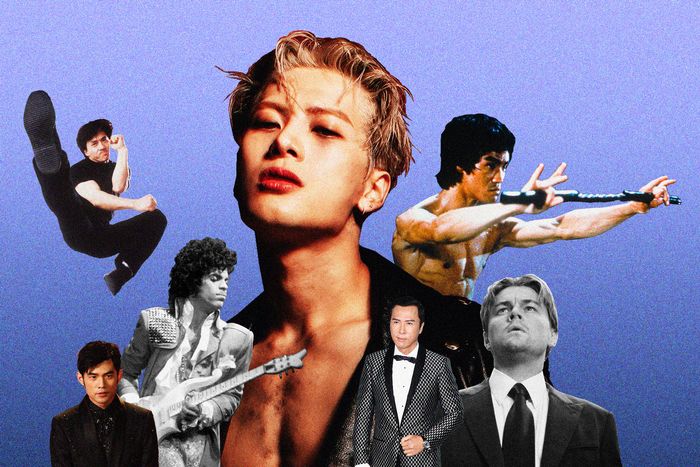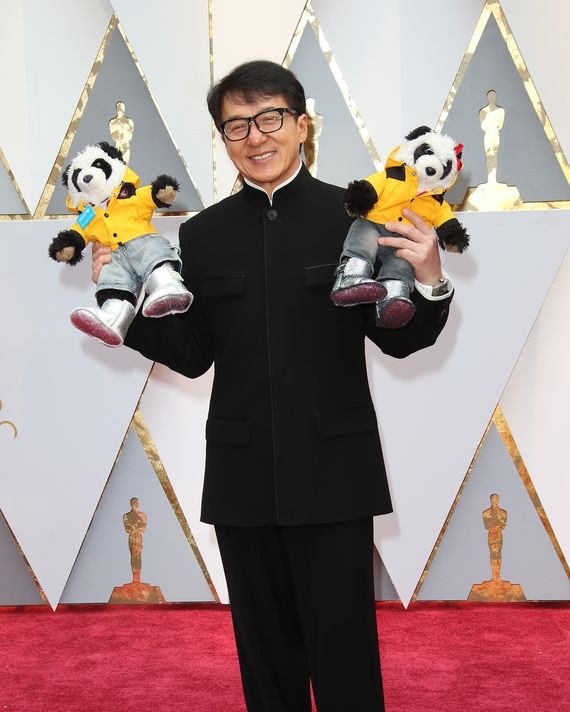
When Jackson Wang emerged from a self-described mental breakdown he had last year, he craved a fresh artistic start. “I’m not saying that I wasn’t being me [before],” he tells Vulture on a recent afternoon. “It’s just, I feel like I should have been more honest and more connected to my audience — showing my other sides, no matter if it’s bad or if it’s good.” That mindset culminated in his new album MAGIC MAN, which ventures into the realms of rock, punk, and pop, adding a decidedly new tone and color to his discography. Studded with references to alcohol, cigarettes, and complicated relationships, the record has an undercurrent of emotional turmoil that permeates even an upbeat track like “Champagne Cool,” where he sings of taking “my troubles with my bubbles.” And thanks to experimentation in the studio, Wang’s vocals shine in a way that he hasn’t fully showcased before, from husky low notes on “All the Way” to falsettos on “Come Alive.” “I’m still in the process of evolving, trying to figure out more and more about myself,” reflects the Hong Kong-born singer and producer, who first shot to fame as the lead rapper of K-pop group GOT7. “Like, hey, I didn’t know I could do that.”
Three years after debuting with GOT7, Wang founded his own record label and kicked off a solo career with the hip-hop track “Papillon.” But this era hasn’t been without its challenges. The 28-year-old Chinese artist says he’s been continually pressed to release catchy, commercial music. That makes him especially proud of MAGIC MAN, which he considers a step in the right direction. Essentially, it’s the album he always wanted to record — even though he predicts it won’t top the charts. “You just can’t be too greedy in wanting to have everything in life,” he says. “For this specific album, I just chose to be me.”
Ahead, Wang outlines a palette of six influences — from Prince to Inception — that shaped his creative approach to MAGIC MAN.
Prince
“I’ve listened to Prince since I was a kid. I think my parents played me that, and then I just stole their CD and played it over and over again myself. [My favorite songs are] “Little Red Corvette,” “Dirty Mind,” and “1999,” of course. There’s two more, “I Wanna Be Your Lover” and “If I Was Your Girlfriend.” Just that rawness; he doesn’t give a damn. I am a big fan of that. It’s that presence of being an artist [that influences me]. Like you won’t say, oh, he’s a singer, a dancer — it’s an artist, you know. It’s the impact of his performance. When he’s there, he gives you 100 percent. You feel like he throws jabs at you in every way. It’s just perfect, his charisma as a performer.”
Training with JYP Entertainment
“Back in the days as a trainee, I tried so hard. And even for the first couple of years when I debuted and I wanted to do my own music, I feel like I was too serious about everything. It became so tense. I would be like, I gotta record, I just gotta cut this song, I gotta create everything within today, and that’s it. But now it’s just like, Yo, if it doesn’t hit me today, maybe tomorrow it will. Maybe the next day. I’ll take my time because at the end of day, it’s art and you just have to let it breathe.
For MAGIC MAN, it’s been more than a year [since we started prepping]. Normally it’s always within a month and a half or two months, always a rush. Sometimes it’s because the producers, you know, the Asia and L.A. time difference. Sometimes it’s the location, we can’t get the permit. Sometimes the dance is not ready. During our prep time, my personal schedules were on top of that, so it made everything even harder. But this time, we weren’t trying to force everything. I just really wanted to take my time. Like if I’m not ready, I’m not ready; I’m going to release this album when I’m ready. So that’s why it took too long.”
Modern and contemporary dance
“I started watching it on YouTube — you know how if you watch one video, they give you suggestions for like 2 billion others? I follow [some favorites] on Instagram. Definitely Madison [Olandt], and Andrea Costanzo Martini. What I like about them is it’s not just movements anymore. I’m not saying that ordinary dance moves don’t mean anything. But to me personally, I feel like it means more than that. They’re just using their body, using the ground, the environment around them, everything, to tell the story, to present their emotions and deliver a message. And for me, that’s exactly art.
The more I watched these kinds of visuals, and the more that I got involved in production, I just felt like, I want to do something like that too. Before we worked on “Cruel,” I was always telling Vinh [Nguyen], all this time I’ve been learning a lot of different dance moves in a way that I feel like people can tell it’s choreo. But the way that I view stuff right now, rather than choreo, it’s more like movements and gestures. I just want to think outside the box for a minute. And in that mentality, I just wanted to do something like, you know what, why does every dance move need to be that? Why can’t we do something else more than that, where it might look weird, but isn’t that art? Rather than focusing like 100 percent or 99 percent on the choreo, maybe we can focus more on the delivery and the narrative of the story.”
His “gut feeling”
“It’s not like I picked rock as something I want to go into for this album. I never had that. I just happened to meet the producers. We started singing, we started writing back and forth through the internet, and then we just happened to make it. The sound, everything just happened because it happened. They play some stuff, I don’t like it. They play some stuff, oh, I like it. I write some stuff, they don’t like it. I write again. We just went with our gut feeling, we weren’t too careful about every single step. We were just like, let’s just go with the vibe.
A lot of times when I record, I tend to care so much about the delivery, the tone, the melody, and everything. I try to be so precise, but then I would be super stressed out. [For this album], I would come back and revisit after 30 minutes and just try to deliver my lyrics and not care about too much of the technical part of it. Let me just try to deliver it in my style one time. Oh, that was okay. And I figured out it’s because it came from me, and it’s the most natural thing possible. Like not trying to force [it and say] it has to be this type of falsetto, my voice has to come out from my chest … all those like technical parts, I really didn’t care about it this time.”
People who have bridged the East and West
“Jackie Chan, Bruce Lee, Donnie Yen, Jet Li, everybody. Even from the music side, Jay Chou. And K-pop, definitely. When I say that I want to be a bridge, that doesn’t mean I would become the bridge. But I’m still going to share more stuff about the East to the West. And maybe it’ll be interesting for [fans] to realize, Oh, I didn’t know they have that in the East. People don’t know how we grow up, what we listen to, what we do. It’s the other side of the world. So all I want to do — as my culture, as my people, as our culture — is just to share and connect. And that’s it. What’s the point of saying, ‘Oh, this is your territory, this is my territory?’ At the end of the day, we’re humans.”
Inception
“You know, ten people watch Inception, they’re gonna have their own interpretation. I watched Inception twice, and I also watched reviews on it. Honestly? I didn’t really get it. But then the more I thought about it, I went through all the processes of like, Oh shit, is it because of this? Is it because that means this in this universe? But that’s … The deeper I got, I just got fed up. And then I started to realize, like, there’s no solid answers for it. It’s just how you view it and how every individual feels towards this art piece. This is what we’re trying to do [with MAGIC MAN]. Also, I love shooting stuff that’s cinematic, and action-related visuals. It’s something that I’ve been into for a couple years already.
You don’t know what’s going to happen [with this album], and you don’t know what is happening at the same time. The more you think about it, the deeper you get. But at the end of the day, it could be something very simple. It’s how you would interpret it. Art is very personal. There’s no specific equations; you can’t calculate that. So that’s why I don’t really like very straightforward and solid answers for a lot of people asking, “Hey, why did you do that? What does this mean?” If there’s a very solid, specific answer for it, I just feel like it takes the fun out of it. Everybody should take it the way that they want to take it.”
This interview has been edited and condensed for clarity.



